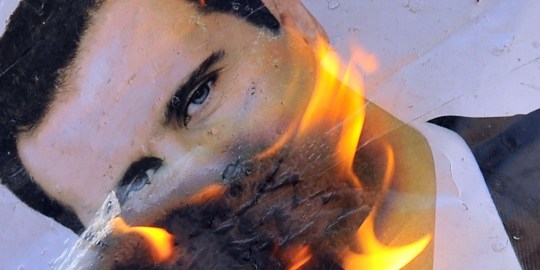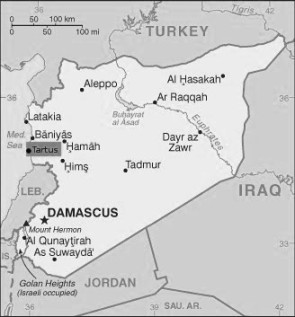Russia Is Ending Assad’s Reign – Why an Intervention Now Appears Likely
Recent developments indicate Moscow’s backing of the Syrian government is coming to an end. This is to d0 with reports that Syria may be readying chemical weapons, whether or not the Putin administration is only using these to drop the Assad regime while saving face is irrelevant. Russia’s changing position on the crisis in Syria can potentially allow for an international reaction that can end the civil war.
 14 of January, 2011, Tunisia’s former President Zine al-Abidine Bel Ali fled the country to take asylum in Saudi Arabia after less than a month of protests. Less than a month from that, after hundreds of thousands take to the streets in Cairo, Barack Obama calls for Hosi Mubarack to step down. On the next day, 11 February, it is announced Mubarack’s presidency would end. After Libya’s Colonel Qaddafi made it clear he would take a different course of action – using the state’s military to suppress opposition to the regime – the UN Security Council authorized an intervention for humanitarian purposes which would take the shape of a NATO no-fly zone. Both Russia and China abstained rather than veto the movement. By August of 2011, Qaddafi had been removed from power.
14 of January, 2011, Tunisia’s former President Zine al-Abidine Bel Ali fled the country to take asylum in Saudi Arabia after less than a month of protests. Less than a month from that, after hundreds of thousands take to the streets in Cairo, Barack Obama calls for Hosi Mubarack to step down. On the next day, 11 February, it is announced Mubarack’s presidency would end. After Libya’s Colonel Qaddafi made it clear he would take a different course of action – using the state’s military to suppress opposition to the regime – the UN Security Council authorized an intervention for humanitarian purposes which would take the shape of a NATO no-fly zone. Both Russia and China abstained rather than veto the movement. By August of 2011, Qaddafi had been removed from power.
The Case of Syria
Like Qaddafi, Syria’s Bashar al-Assad has made it clear he does not intend to leave peacefully. The Syrian regime’s only response as of yet has been violence, and increased violence when the first escalation of violence fails to quell unrest. As I outlined in Turkey: The country that can end Assad’s bloody reign, a Western response would essentially be an American one, as it would depend on American firepower.
At first, Washington was reluctant to intervene due to difficulties in conducting an intervention. Syria’s population (which is several times larger than Libya’s) is “tucked in or alongside mountainous terrain” presenting “a set of challenges for interveners looking to minimize civilian casualties.” The geography of Libya on the other hand is much more favourable to an air-campaign. Furthermore, “Syria’s military is more than eight times what Colonel Qaddafi’s was.”
As the death toll in Syria rises, it has become clear Washington’s hands have been tied. I argue the US has been prevented from intervening because an intervention could not be legitimised by the UN. Russia and China have three times vetoed resolutions pushing for sanction on Syria at the UN, therefore it is clear they would not allow any resolution allowing an intervention. The Obama administration will not declare an unsanctioned war in the Middle East. Obama inherited the legacy of 2003’s Iraq War which severely damaged America’s international image. As stated in my previous article on Syria, President Obama’s entire foreign policy is based on overcoming the damage Iraq did to America’s reputation. Obama’s The Audacity of Hope argues that the use of multilateral force is critical to the US’s interests – “[w]hen the world’s sole superpower willingly restrains its power and abides by internationally agreed-upon standards of conduct, it sends a message that these rules are worth following, and robs terrorists and dictators of the argument that these rules are simply tools of American imperialism.” An intervention in Syria is illegal under international law unless sanctioned by the UN Security Council, and as of yet Russia and China have made it clear they would veto any such resolution. Thus America cannot intervene in Syria because it risks damaging its image, and thus its legitimacy.
Russia and China’s Response to Libya
Russia and China both abstained from voting to allow the intervention in Libya to be legal. I argue this is essentially because both states saw the writing on the wall, Qaddafi was a dead man walking. Neither wanted to be on the wrong side of history, and lose political capital with the new Libyan government or the Arab world, as Arab countries such as Qatar and the United Arab Emirates were included in the intervention.
 Russia’s position on Syria
Russia’s position on Syria
Thus far Russia has been reluctant to allow an intervention because Moscow believes the NATO intervention in Libya surpassed the authorization of the UN resolution. Moreover, Syria is Russia’s last ally in the region other than Iran – an increasingly marginalized player and a rogue state. Russia also possesses a Mediterranean naval-port in Tartous; it could lose this strategically vital military base should the Assad regime fall. As I explained in The Wiley Bear – Russian Motives for the Nord Stream Pipeline, the Putin Administration is determined to reinstate Russia as a great-power in the international state system. To lose an ally in the geopolitically important region of the Middle East would be anathema to the Kremlin.
Russia’s position is essential to solving the crisis
I get the notion China would abstain from a UN motion on Syria should Russia also abstain. China was quick to abandon Qaddafi, and would likely be quick to abandon Assad as well should Russia allow an intervention. Beijing cares more about trading with the new government than supporting the old. Thus if Russia’s position changes, an intervention of some sort would become possible.
Russia’s changing position
As the death toll reaches 40-50,000, and recent reports state Assad is moving chemical weapons stockpiles, inferring Assad may be preparing to use chemical weapons against the Syrian population, Putin may be beginning to realize he has tied Russia not only to a dead man, but a mad man. As Price explains in The Chemical Weapons Taboo, there exists a norm in international relations wherein it is morally reprehensible for a state to use chemical weapons. Indeed, unlike many other horrendous weapons, chemical weapons have only been used three times in historic warfare: World War 1, Italy’s 1935-1936 invasion of Ethiopia, and 1980-1988 Iran-Iraq War. Therefore, this crucial development in Syria may be enough to convince the Kremlin Assad has fallen out of favor in the international community. The regime will fall eventually, by propping a doomed Damascus, Moscow can lose political capital with the international community.
On the 7 December US Secretary of Defence Leon Panetta declared that it has become more likely Assad will use chemical weapons against the rebels, an outcome both the US and Russia call “unacceptable.” Indeed there have been reports Syria is “moving” chemical weapons. Assad’s regime has stated it does not intend to use chemical weapons. Although there is no reason to trust this statement, it is true that using chemical weapons in this scenario does not make good strategic sense. It is impossible to ‘aim’ poison gas, and thus there is no way to protect the regime’s supporters.
A critic may argue Assad may be acting irrationally at this point. The Syrian regime appears to have no problem waging war on its population. Shelling too can unintentionally target the regime’s own supporters, why is gas any different? But this is all beside the point, whether Syria intends to use chemical weapons or not is irrelevant. Russia may be using ‘the chemical weapons taboo’ as a means of saving face while abandoning the ally it has backed for so long. By backing Assad Russia risks isolating itself in the region. Turkey, Saudi Arabia, and Qatar have all condemned the Syrian regime, both Saudi Arabia and Qatar are rich in resources, and Turkey is a major player in the region. Thus Russia is looking for an excuse to drop Assad – whose fall is now seen as inevitable anyway.
Significance of recent developments
UN Mediator Lakhdar Brahimi called 6 December’s discussion between US Secretary of State Hilary Clinton and Russian Foreign Minister Sergei Lavrov in Dublin “constructive.” On the same day Putin made statements inferring Moscow was losing patience with Assad. I argue this is directly related to reports that Assad may be readying Syria’s poison gas arsenal. Whether as a face-saving means of dropping Assad, or because of the taboo chemical weapons present, Russia is abandoning Syria because of these reports. I argue this paves the way for an intervention in Syria. Although a no-fly zone may not be implemented, I predict there will be major international developments that attempt to end the bloody reign of Assad in the coming weeks. These developments cannot come soon enough, indeed they were needed for awhile.
Works Cited
Gladstone, Rick. “Friction at the U.N. as Russia and China Veto Another Resolution on Syria Sanction.” The New York Times, 19 July 2012.
http://www.nytimes.com/2012/07/20/world/middleeast/russia-and-china-veto-un- sanctions-against-syria.html?_r=0
Heather Roff and Bessma Momani, “The tactics of intervention: Why Syria will never be Libya,” The Globe and Mail, 25 October 2011, last modified 31 October 2011.
http://www.theglobeandmail.com/news/opinions/opinion/the-tactics-of- intervention-why-syria-will-never-be-libya/article2212174/
“The Libyan Dilemma.” The Economist, 10 September 2011.
http://www.economist.com/node/21528664
Meyer, Henry. “Russia Could Lose Last Arab Ally as Assad Regime Teeters.” Bloomberg, 19 July 2012.
http://www.bloomberg.com/news/2012-07-19/putin-faces-loss-of-last-arab-ally- s-assad-s-regime-teeters.html
Obama, Barack. The Audacity of Hope. New York: Random House Inc., 2006.
Price, Richard M. The Chemical Weapons Taboo. Ithaca, Cornell University Press, 1997.
“Remarks by the President in Address to the Nation on Libya.” Whitehouse Website, last modified 28 March 2011.
http://www.whitehouse.gov/the-press-office/2011/03/28/remarks-president- address-nation-libya
“Russia, U.S. talk as Syria events “accelerate on the ground.” Reuters, 6 December 2012.
http://www.reuters.com/article/2012/12/06/us-syria-crisis- idUSBRE8AJ1FK20121206
Sanger, David E. and Eric Schmitt. “Syria Moves Its Chemical Weapons, and the U.S. and Allies Cautiously Take Note.” The New York Times, 2 December 2012.
“Security Council Approves ‘No-Fly Zone’ Over Libya, Authorizing ‘All Necessary Measures’ To Protect Civilians, By Vote of 10 in Favour and 5 Abstentions.” Security Council Department of Public Information, 17 March 2011.
http://www.un.org/News/Press/docs/2011/sc10200.doc.htm
Simon Tisdall. “Turkey calls on major powers to intervene in Syria.” The Guardian, 19 October 2012.
http://www.guardian.co.uk/world/2012/oct/19/turkey-britain-us-intervene-syria
“US and World wrongfoorted by Mubarak as White House tries to keep up.” The Guardian, 11 February 2011.
http://www.guardian.co.uk/world/2011/feb/10/obama-wrongfooted-mubarak- Egypt
“With was shifting, US, Russia talk Syria’s future.” Associated Price, 7 December 2012. http://www.google.com/hostednews/ap/article/ALeqM5h_O8jsnewuaZMLGw45fI qZ955yTw?docId=a0ccdac386f64eb68b130b0aa989b026
“Why Russia is standing by Assad’s Side.” BBC News, 15 June 2012.
http://www.bbc.co.uk/news/world-europe-18462813
“Zine al-Abidine forced to flee Tunisia as protesters claim victory.” The Guardian, 15 January 2011. http://www.guardian.co.uk/world/2011/jan/14/tunisian-president- flees-country-protests


I understand there have been many predictions that Assad’s regime will collapse over the 20 month long crisis, none have yet held true. Nonetheless I believe these developments warrant my article.
Good piece. I think one of the problems I have is that it would be nice to have Russia intervene, or at least stop the bloodshed, but the U.S. is out to lunch. If we don’t lead, or constantly advocate for our ideals, then someone else will.
Thanks for the feedback.
Just a disclaimer, I think it is highly unlikely that Russia will personally intervene in Syria, however I do believe it will soon allow for a US-led international intervention of some sort.
Got it. Thanks. Russia will likely still only play power games with us.
I may predicted an intervention too late, Assad now appears likely to fall without one, nonetheless this article examines why Russia is abandoning the doomed regime